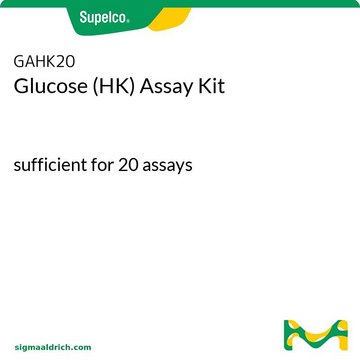MAK084
Glucose Uptake Fluorometric Assay Kit
sufficient for 100 fluorometric tests
Se connecterpour consulter vos tarifs contractuels et ceux de votre entreprise/organisme
About This Item
Code UNSPSC :
12161503
Nomenclature NACRES :
NA.84
Produits recommandés
Utilisation
sufficient for 100 fluorometric tests
Méthode de détection
fluorometric
Maladie(s) pertinente(s)
endocrinological disorders, diabetes; cancer
Température de stockage
−20°C
Description générale
The new Glucose Uptake Assay Kit, MAK489, is now available! Glucose is the primary source of energy for most cells.Transport of glucose across the plasma membrane is the first rate limiting step in glucose metabolism. Glucose uptake is facilitated by the GLUT family of transporter proteins, whose expression and activity are regulated by multiple mechanisms. Glucose uptake is upregulated in many cancer cells, which exhibit high rates of aerobic glycolysis. Cells exhibiting insulin resistance show diminished glucose uptake in response to insulin stimulation.
Application
Glucose Uptake Fluorometric Assay Kit has been used to measure the amount of glucose uptake by monocytic myeloid-derived suppressor cells (M-MDSCs).
Adéquation
Suitable for detecting glucose uptake in adherent or suspension cells cultured in a 96-well microtiter plate.
Principe
The Glucose Uptake Fluorometric Assay kit provides a simple and direct procedure for measuring glucose uptake in a variety of cells. Glucose uptake is measured using the glucose analog, 2-deoxyglucose (2-DG), which is taken up by cells and phosphorylated by hexokinase to 2-DG6P. 2-DG6P cannot be further metabolized and accumulates in cells, directly proportional to the glucose uptake by cells. In this assay, 2-DG uptake is determined by a coupled enzymatic assay in which the 2-DG6P is oxidized, resulting in the generation of NADPH, which reacts with the probe to generate a fluorometric (λex = 535/λem = 587 nm) product, proportional to the 2-DG taken up by the cell.
Produit(s) apparenté(s)
Réf. du produit
Description
Tarif
Remplacé(e)(s) par
Réf. du produit
Description
Tarif
Mentions de danger
Conseils de prudence
Classification des risques
Aquatic Chronic 3
Code de la classe de stockage
10 - Combustible liquids
Point d'éclair (°F)
188.6 °F - closed cup
Point d'éclair (°C)
87 °C - closed cup
Faites votre choix parmi les versions les plus récentes :
Certificats d'analyse (COA)
Lot/Batch Number
Vous ne trouvez pas la bonne version ?
Si vous avez besoin d'une version particulière, vous pouvez rechercher un certificat spécifique par le numéro de lot.
Déjà en possession de ce produit ?
Retrouvez la documentation relative aux produits que vous avez récemment achetés dans la Bibliothèque de documents.
Tingting Wu et al.
Scientific reports, 6, 20250-20250 (2016-02-03)
CD11b(+) Gr1(+) myeloid-derived suppressor cells (MDSCs) play critical roles in controlling the processes of tumors, infections, autoimmunity and graft rejection. Immunosuppressive drug rapamycin (RPM), targeting on the key cellular metabolism molecule mTOR, is currently used in clinics to treat patients
Mechanisms for insulin resistance: common threads and missing links.
Samuel V T and Gerald I S
Cell, 148(5), 852-871 (2012)
Chapter Twenty-Two Mechanisms and Methods in Glucose Metabolism and Cell Death.
Zhao Y, et al.
Methods in Enzymology, 442, 439-457 (2008)
Yang Zhao et al.
Blood, 131(14), 1587-1599 (2018-02-22)
Monocytes and macrophages play a key role in defending pathogens, removing the dead cells or cell debris, and wound healing. The mammalian target of rapamycin (mTOR) inhibitor rapamycin (RPM) is widely used in clinics to treat patients with organ transplantation
Norio Yamamoto et al.
Analytical biochemistry, 375(2), 397-399 (2008-02-12)
To determine 2-deoxy-D-glucose (2DG) and 2-deoxy-D-glucose 6-phosphate (DG6P) in mouse tissue after injection of 2DG, we have developed a novel assay. This assay is a simple procedure involving incubation of samples with four independent, single reaction mixtures followed by measurement
Notre équipe de scientifiques dispose d'une expérience dans tous les secteurs de la recherche, notamment en sciences de la vie, science des matériaux, synthèse chimique, chromatographie, analyse et dans de nombreux autres domaines..
Contacter notre Service technique

![2-Deoxy-2-[(7-nitro-2,1,3-benzoxadiazol-4-yl)amino]-D-glucose ≥97% (HPLC)](/deepweb/assets/sigmaaldrich/product/structures/104/527/40bd5a41-ebc4-484e-a10e-891fecfaea79/640/40bd5a41-ebc4-484e-a10e-891fecfaea79.png)

